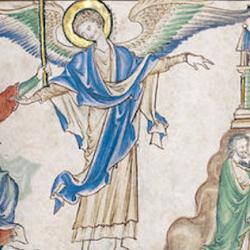The first angel in Revelation 14 announces what most translations calls an “eternal gospel” (v. 6; Gr. euaggelion aionion). David deSilva prefers to translate it “an age-long accession announcement” (279).
The picture in view is this: “this angel in the role of herald of a great ruler, a supra-mundane emperor,making this announcement ‘over’ or ‘upon’ (epi) the audience, a spatial preposition again implying hierarchical superiority. We see the audience at a vast scale—the people living . . . on the land/earth and every nation and tribe and language group and people. . . . .The language requires of us that we see not only universal humanity but universal humanity specifically across all its divisions and separations. The universality of the message and of the rule that it announces unites humanity into an audience and is of such a broad scope as to suggest that ‘empire; space is the only scale grand enough to approximate it. We are invited to ‘see’ this audience almost as we can only ‘see’ when looking at a map or a globe—multiple geopolitical zones overlaid with multiple ethnoi, as comprehensive a ‘map’ of peoples and spaces as we (qua the ideal late first-century audience) can possibly envision. In other words, we see it from the angel’s point of view” (279-80).
This announcement resembles the accession announcements for a new Roman emperor: “The scene of the first angel’s announcement blends experiences of empire, in which a herald or envoy can proclaim an accession announcement to the multiethnic, multilingual people groups across the provinces or issue an edict calling for acknowledgment of imperial rule, with the traditional Jewish-Christian cosmology in which God rules over the cosmos he created and issues forth messages and brings about his will through angelic messengers and ministers” (283).
As deSilva notes, this makes good sense of the sequence of three angelic announcements: “The ‘good news’ that constituted the announcement of Vespasian’s accession after the tumultuous civil wars of 68-69 CE. and the defeat of his rivals would have provided a rather recent display of this sequence. An announcement is made concerning who is indeed the ‘last man standing’ in a contest for rule over the empire (over ‘every nation and tribe and language group and people’). A second announcement follows concerning the overthrow of the loser. . . . [A] third message follows, announcing forthcoming punishments for those who allied themselves with the wrong side. Even the coda follows naturally as a word of encouragement to those who are walking in line with their allegiance to the eventual winner” (296). This makes good sense of the makarism (blessing) that follows in 14:13: Those who have been loyal to Jesus will receive their deserved rest.
In a footnote, he says that many are “clear to distinguish this ‘gospel’ from ‘the Gospel,” and notes that “few critical commentators would not agree . . . that the angel proclaims ‘the Gospel, pure and simple’” (279, fn 33).
But why would that be? Why would this not be the gospel itself, the announcement that the Creator is taking over as Lord of all nations, that He has overthrown “Babylon,” and that He will reward His loyal followers as He judges His adversaries?
(DeSilva, “Seeing Things John’s Way: Rhetography and Conceptual Blending in Revelation 14:6-13,” Bulletin for Biblical Research 18:2 [2008] 271-98.)














